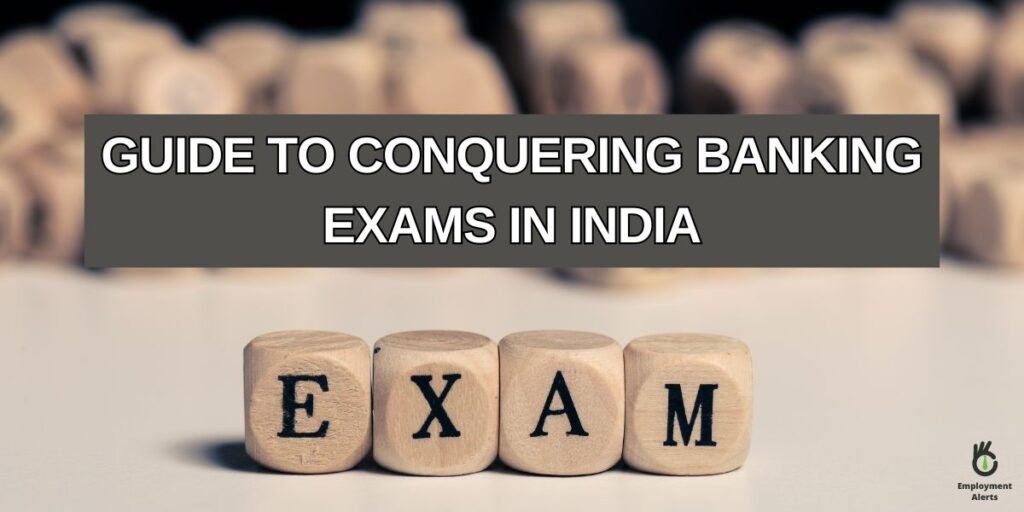The allure of a stable and promising career in the Indian banking sector is undeniable. But to unlock that door, you need to navigate the competitive landscape of bank entrance exams. Fear not, aspiring banker! This comprehensive guide delves deeper into each step, equipping you with the knowledge and strategies to dominate those exams.
Step 1: Deep Dive into the Exam
- Target with Precision: Beyond just identifying the exam (IBPS PO, SBI Clerk, etc.), understand the specific needs of the targeted bank or institution. Research their work culture, focus areas, and any unique skills they might value.
This empowers you to tailor your preparation and highlight relevant strengths during the selection process.
- Exam Pattern Deconstructed: Don’t just skim the exam format; dissect it! Analyze the weightage for each section (Quantitative Aptitude, Reasoning Ability, English Language, General Awareness/Computer Knowledge). This helps you prioritize study time effectively.
Step 2: Building Your Arsenal – A Resource Roundup
- Textbook Titans: Go beyond the basic “recommended books” list. Explore alternative resources to find the writing style and approach that resonates best with your learning style.
Online platforms like Testbook and GradeUp can offer additional resources and interactive learning.
- Mock Tests – Your Exam Simulators: Mock tests are not just practice runs; they’re crucial data points. Choose a platform that offers a variety of mock tests with detailed solutions and performance analysis.
Analyze your strengths and weaknesses in each section after each mock test. Track your progress over time to identify areas that require more focus.
- Previous Papers – A Glimpse into the Past: Solving previous years’ question papers exposes you to actual exam questions and difficulty levels. This helps you understand the examiner’s mindset and identify recurring themes or question types.
Step 3: Crafting Your Strategy – A Personalized Approach
- Time Management Mastery: Move beyond a simple study schedule. Create a daily or weekly routine that factors in your personal learning pace and energy levels. Utilize techniques like the Pomodoro Technique (25 minutes of focused study followed by a short break) to maximize productivity.
- Conquer Your Weaknesses: Don’t shy away from your weaker areas. Identify the specific topics within each section that challenge you. Dedicate focused study time to mastering these concepts.
Consider enrolling in online courses or seeking guidance from mentors for specific topics.
- Practice with Purpose: Move beyond simply solving questions for speed. Focus on understanding the underlying concepts and logic behind each question.
This empowers you to tackle new or unseen question types during the actual exam.
Step 4: Subject-Specific Strategies – Sharpening Your Skills
- Quantitative Aptitude – From Basics to Speed: While a strong foundation in math fundamentals is crucial, don’t get bogged down in complex calculations.
Master shortcut methods and approximation techniques to solve problems quickly and efficiently. Utilize online platforms and mobile apps for quick revision and practice quizzes.
- Reasoning Ability – Think Critically, Solve Logically: Practice solving various types of puzzles, syllogisms, and critical thinking questions.
Develop strong analytical and problem-solving skills. Regularly participate in online reasoning ability challenges to hone your skills under timed conditions.
- English Language – Mastering the Nuances: Expand your vocabulary beyond rote memorization. Read newspapers, editorials, and articles on diverse topics to enhance your reading comprehension and writing skills.
Practice writing concise and error-free essays on relevant banking topics.
- General Awareness/Computer Knowledge – Stay Informed, Stay Ahead: Don’t underestimate the importance of staying updated on current affairs, especially economic news, banking policies, and government initiatives.
Develop a habit of reading a daily newspaper and following credible financial news sources. For Computer Knowledge, focus on gaining a basic understanding of computer hardware, software, and MS Office applications.
Step 5: The Mental Marathon – Staying Motivated
- Find Your Support System: Surround yourself with positive influences. Join online forums or study groups dedicated to bank exam preparation.
Share strategies, motivate each other, and celebrate each other’s successes.
- The Power of Positivity: Develop a growth mindset. Believe in your ability to learn and improve. View setbacks as learning opportunities and fuel for your determination. Visualize yourself achieving your goal and celebrate small milestones along the way.
- Prioritize Well-being: Remember, you are not a machine. Ensure adequate sleep (7-8 hours), healthy food habits, and regular exercise to maintain physical and mental well-being during your preparation. Taking breaks and engaging in activities you enjoy can help prevent burnout.
Bonus Tip: Coaching institutes can provide additional guidance and structured learning, but they aren’t a magic solution.
By following these steps and dedicating yourself to consistent preparation, you’ll be well on your way to cracking that bank exam and securing your dream banking career!
